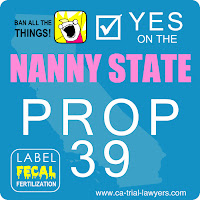There has been an enormous amount of disinformation coming from both sides during the campaign, and I'd like to try insert a little reason into the debate.
GMO labeling might make a little sense if: 1. People understood genetic engineering, and 2. We labeled ALL FOOD with information about how it is produced.
To be consistent, we'd need a warning label on anything that was fertilized with fecal matter: "May contain E. coli, which is a dangerous bacteria that can cause severe illness and death."
Organic Super Sweet Corn would need this label: "Carries a genetic mutation induced by radiation mutagenesis." Organic produce treated with the natural pesticide rotenone would be labeled: "May contain trace amounts of rotenone. Chronic exposure can cause liver and kidney damage."
All of the above are true, but none of these agricultural techniques present a significant health risk. To the uninformed though, the labels would make them seem like they do. The point is that labeling a food product with all of the scary sounding production techniques does no good without an understanding of those techniques. We definitely need more education about genetic engineering, but labeling is not education.
 Say you're OK with the increased cost or reject that argument altogether. Consider the lesson of Prop 65, another California ballot initiative approved by voters in 1986. That measure ostensibly required warnings on products known to cause cancer or birth defects. Sounds like a good thing on the outside, but a deeper look will find that it has done nothing but line the pockets of lawyers to the tune of tens of millions of dollars.
Say you're OK with the increased cost or reject that argument altogether. Consider the lesson of Prop 65, another California ballot initiative approved by voters in 1986. That measure ostensibly required warnings on products known to cause cancer or birth defects. Sounds like a good thing on the outside, but a deeper look will find that it has done nothing but line the pockets of lawyers to the tune of tens of millions of dollars.Prop 65 requires restaurant owners to warn customers that they sell "cancerous products" because they sell olives, bread, chicken, and hundreds of other food items because they contain trace amounts of some substance that caused cancer in a rat at high doses. Never mind that the substances in question occur naturally in those foods. Prop 65 has created the practice of over warning customers just to avoid being sued, so much so that the warnings have become meaningless.
Perhaps the biggest problem with mandated GMO labeling is that it's yet another government mandate. For those who believe in a free market, this should be a no-brainer. If you believe in the free market and reject the nanny state, there is a much better option.
The real obstacle to consumers' right to know is the result of FDA policies that severely restrict how non-GMO products can be promoted and labeled. And the real solution is to require the FDA to allow non-GMO labeling. If there truly were a market for non-GMO products, they would be labeled as such if allowed. As it is now, a certified organic label is a reasonable assurance that the product is GMO free, but that is not enough. Consumers would benefit from non-organic non-GMO foods being labelled as such.
The whole movement to label GMOs is really just a canard anyway. If GMOs are dangerous, they should be banned, not labelled. Considering that we've all been eating them for a couple decades, all insulin is GMO, there is not a single documented death or negative health effect, and the bulk of scientific evidence supports GMO safety, a ban is not in the cards.
Labeling GMOs would provide no positive benefit for the vast majority of people. It will increase food prices, increase taxes, increase headaches for food sellers, and line the pockets of lawyers. Most importantly, labeling without education only encourages fear and ignorance, and decisions based on fear and ignorance are rarely good decisions.


